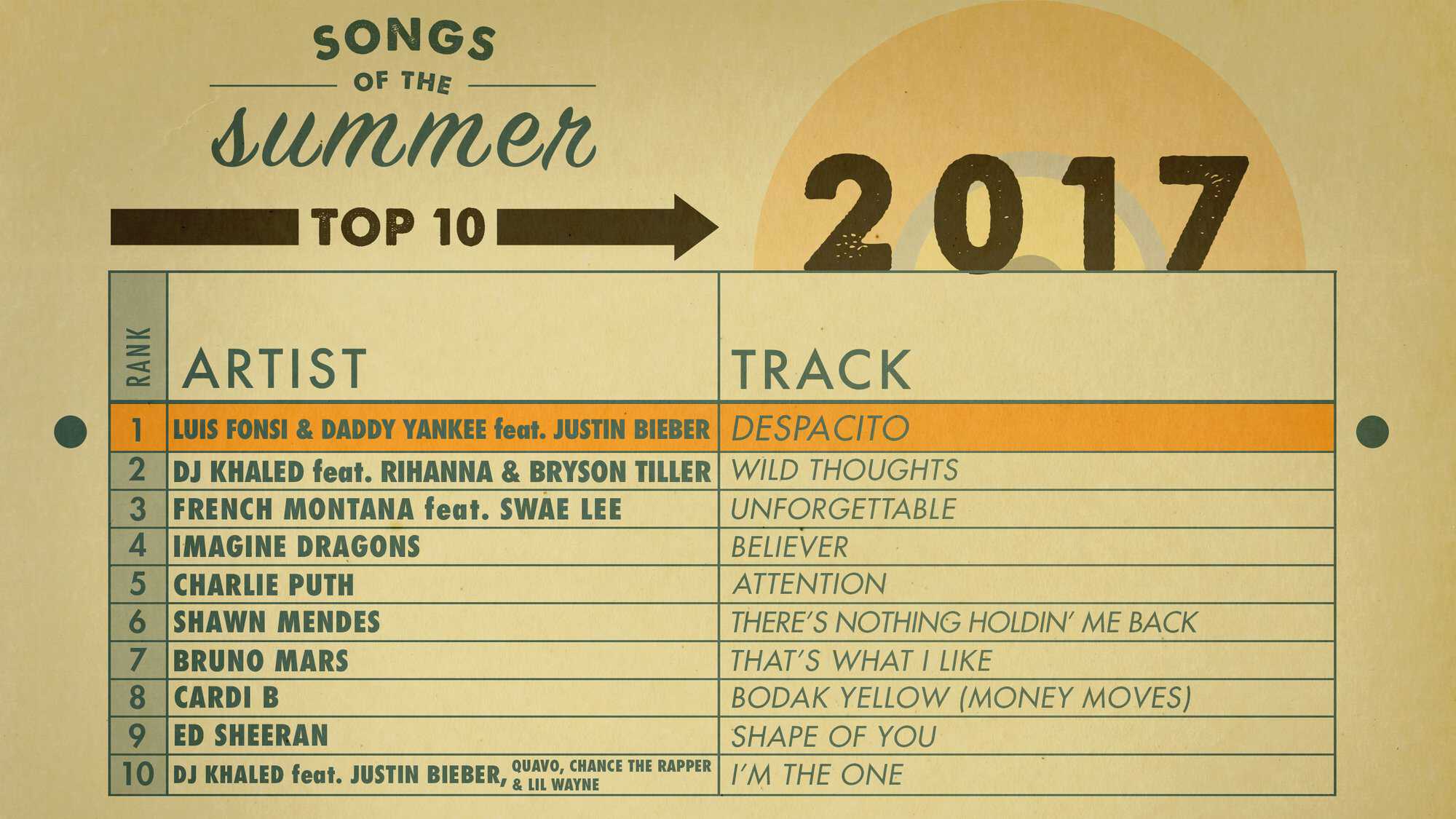2017 | Despacito by Luis Fonsi and Daddy Yankee Featuring Justin Bieber
From the Collection: Songs of the SummerA Latin hit crosses over... or is it the other way around?
by Petra R. Rivera-Rideau

I didn’t expect that, amidst chants of “build the wall,” the song of the summer would be predominantly Spanish — only the third Spanish-language song to reach number one on the Hot 100. At the time of this writing, the “Despacito” remix has remained at the top of the charts for fifteen weeks. The catchy tune by Latin pop veteran Luis Fonsi, featuring reggaetón pioneer Daddy Yankee and pop star Justin Bieber, rapidly shot to number one in May, became the most streamed song in history in July, and garnered the most YouTube views ever in August.
It certainly feels significant: not only does the remix retain its reggaetón beat and Fonsi and Yankee’s original verses, Bieber, a white Canadian, sings the chorus in Spanish. People have argued that “Despacito” shatters cultural barriers. Luis Fonsi himself has claimed that the song can build bridges, not walls. But who — if anyone — is crossing over that bridge?
It’s a complicated question. Historically, the term “crossover” — defined as moving from a niche market into the mainstream — has implied that Latin musicians are the ones wanting to break into English-language markets. When artists like Ricky Martin, Shakira, or Marc Anthony record English-language albums, they’re presented as “discoveries” — even when they’ve long since achieved global success. And when one of their songs climbs the charts, it’s called a “crossover” hit.
But not all Latin artists care to cross over. Bronx-born Romeo Santos, who sings almost entirely in Spanish, has sold out Yankee Stadium twice and made bachata hits with artists like Usher and Drake. In an interview with Fader Magazine, he said, “I’m sending the message I’m not interested in crossing over. I want you to cross over into my world.” In the case of “Despacito,” Fonsi has said that he never intended to write a crossover hit. It was, in fact, Bieber who asked to record the remix after hearing “Despacito” in Colombia. And so it seemed that the English-speaker had crossed the bridge.
While Bieber’s motivations for recording “Despacito” are unknown — maybe he’s just really into Latin music? — one thing is for sure: tapping into the Latin music market can yield major profits. According to Billboard, Latinos’ buying power in America was estimated at $1.5 trillion dollars in 2015, and Latin consumers drive the growth of streaming services. With “Despacito,” Bieber earned his first spot at the top of the Hot Latin songs chart (where, upon the remix’s release in April, the original “Despacito” had already dominated for fifteen weeks), along with his fifth number one hit on the Hot 100.
Just two weeks after the release of “Despacito” remix, Bieber won the “Crossover Artist of the Year” at the Billboard Latin Music Awards. Many media outlets have applauded his linguistic experimentation: Latina Magazine called the remix “Fuego,” and Vibe declared that with Spanish, Bieber “may have struck gold.” But it wasn’t long before Bieber stopped performing the song because, as he admitted in Stockholm, he doesn’t actually know the lyrics.
In May, a viral video of the pop star singing “I don’t know the words so I say burrito… I don’t know the words so I say Dorito” had surfaced. Critics accused him of cultural appropriation, arguing that Bieber had no genuine interest in Latin music. And even that might be putting it too lightly: the anthropologist Jane Hill defines “Mock Spanish,” as the integration of Spanish phrases or terms into English in ways that covertly present Spanish as a foreign intrusion into an otherwise English-speaking world. Bieber’s replacing the lyrics with stereotypical “Latino” food may seem like innocent shenanigans, but it also casts Spanish-speakers as perpetual foreigners — despite the fact that U.S. is home to the second-largest Spanish-speaking population in the world.
Some came to Bieber’s defense. In a Rolling Stone article, Fonsi said that he appreciated Bieber’s efforts to record in Spanish, and that the song’s fast tempo made it difficult for even native Spanish speakers. Leila Cobo, who covers Latin music for Billboard, wrote, “So Bieber’s Spanish isn’t perfect. It still sounds pretty good to me in the recording. Is he now supposed to speak it fluently, too?” Then again, is it really unreasonable to assume that an artist would know the words to his number one single, even if they are in Spanish?

Ultimately, the success of “Despacito” must be understood in the context of the country’s larger social and political picture, one in which some Senate Republicans have proposed the strictest immigration measures in fifty years, the White House vows mass deportations, and white nationalists plan open protests across American cities. “Despacito” is unquestionably the song of the summer, an impressive feat in today’s political climate, but does it signal lasting social change? It’s unlikely. Just as it’s possible to sing a Spanish song without speaking the language, it’s possible to play (and play and play) a Spanish song without embracing the culture that created it.

Petra R. Rivera-Rideau is Assistant Professor of American Studies at Wellesley College. She is the author of Remixing Reggaetón: The Cultural Politics of Race in Puerto Rico (Duke University Press, 2015).
Published August 2017







